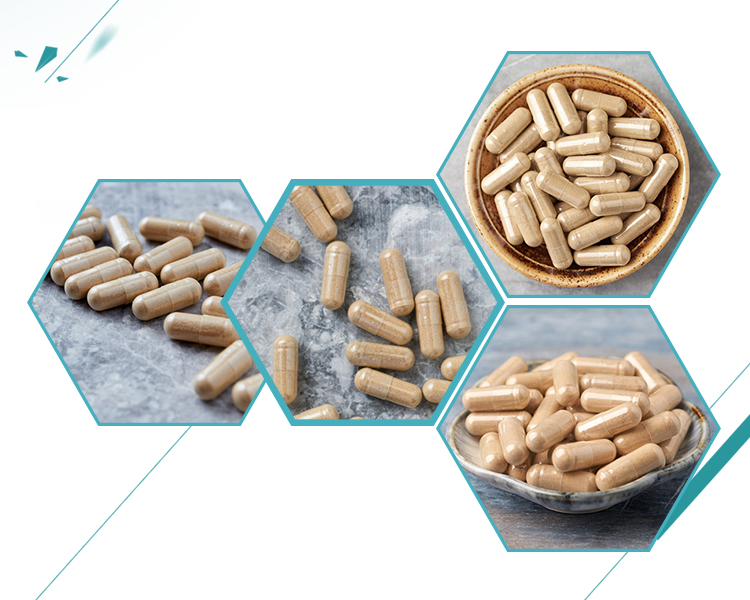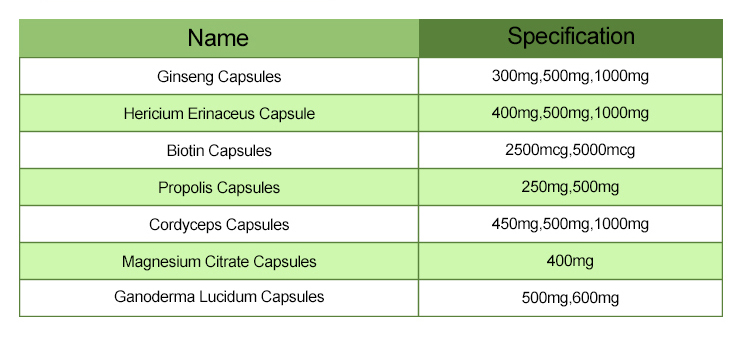The basic ingredient in Ginseng capsules is, unsurprisingly, ginseng. Ginseng is a slow-growing perennial plant with fleshy roots belonging to the genus Panax. There are several species of ginseng, including Panax ginseng (Asian or Korean ginseng), Panax quinquefolius (American ginseng), and Panax notoginseng (Chinese ginseng).
The active compounds in ginseng, called ginsenosides, are believed to be responsible for its medicinal properties. Ginseng is often used in traditional medicine for its potential benefits such as boosting energy, reducing stress, improving cognitive function, and enhancing overall well-being.
In Ginseng capsules, ginseng extract or powdered ginseng root is typically the primary ingredient. Other ingredients might include fillers, binders, or additional herbs and supplements depending on the formulation. It’s important to check the product label for specific ingredients and concentrations.

The application of Ginseng Capsules
Ginseng capsules, derived from the root of the ginseng plant, have been used for centuries in traditional medicine, particularly in East Asia. Ginseng is believed to have various health benefits, although scientific evidence supporting some of these claims is still emerging. Here are some potential applications of ginseng capsules:
Boosting energy levels: Ginseng is often touted for its ability to increase energy and reduce fatigue. It’s believed to enhance physical stamina and mental alertness, making it popular among athletes and those seeking improved concentration and productivity.
Improving cognitive function: Some studies suggest that ginseng may have cognitive-enhancing properties, including improved memory, focus, and overall cognitive function. This makes it of interest to students, professionals, and the elderly seeking to support brain health.
Adaptogenic properties: Ginseng is classified as an adaptogen, meaning it may help the body adapt to stressors, whether physical, chemical, or biological. It’s believed to support the body’s natural resistance to stress and promote overall well-being.
Enhancing immune function: Ginseng is thought to have immunomodulatory effects, meaning it may help regulate the immune system. Some research suggests that ginseng may increase the production of certain immune cells, potentially bolstering the body’s defenses against infections and illnesses.
Managing diabetes: There’s some evidence to suggest that ginseng may help regulate blood sugar levels in people with diabetes. It’s believed to improve insulin sensitivity and glucose metabolism, although more research is needed to confirm its effectiveness and optimal dosage.
Supporting cardiovascular health: Ginseng may have beneficial effects on heart health by improving circulation, reducing inflammation, and lowering cholesterol levels. These effects could potentially reduce the risk of cardiovascular diseases like heart disease and stroke.

Enhancing sexual function: Ginseng has a long history of use as an aphrodisiac and is believed to improve sexual function in both men and women. Some studies suggest that ginseng may help increase libido, improve erectile dysfunction, and alleviate symptoms of menopause.
Supporting mood and stress management: Ginseng is thought to have mood-regulating properties, potentially reducing symptoms of anxiety and depression. It’s believed to act on neurotransmitters like serotonin and dopamine, which play key roles in mood regulation.
It’s important to note that while ginseng capsules are generally considered safe for most people when taken as directed, they may interact with certain medications and health conditions. It’s always a good idea to consult with a healthcare professional before starting any new supplement regimen, especially if you have underlying health concerns or are taking medications. Additionally, individual responses to ginseng may vary, so what works for one person may not necessarily work for another.
